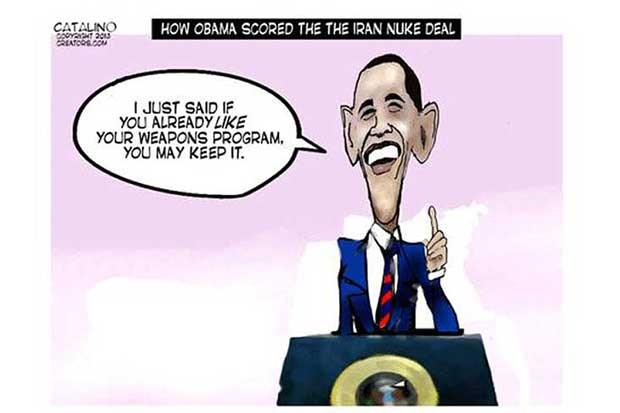It will be interesting to see how President Barack Obama responds to charges coming out of Tehran that the White House is distorting the terms of the just signed multiparty agreement easing sanctions against Iran in exchange for that country’s backing off its efforts to develop a nuclear weapons program.
“Iranian officials say the White House is misleading the public about the details of an interim nuclear agreement reached over the weekend in Geneva,” the Washington Free Beacon reports.
Citing the Iranian press, the Free Beacon quoted Iranian Foreign Ministry Spokesman Marziyeh Afkham as saying Tuesday, “What has been released by the website of the White House as a fact sheet is a one-sided interpretation of the agreed text in Geneva and some of the explanations and words in the sheet contradict the text of the Joint Plan of Action, and this fact sheet has unfortunately been translated and released in the name of the Geneva agreement by certain media, which is not true.”
So even before the ink on the document is dry one of the parties to it is telling people it does not say what the Obama administration has been telling people it says. As they say in the movies, “This cannot be good.”
The deal to lift some sanctions and unfreeze some Iranian assets over a six month period in exchange for Iran’s good behavior was never a good idea. It’s too much like what has played out on the Korean peninsula over several decades as China, Japan, and the United States gave food and other aid to the various North Korean regimes as a bribe intended to deter them from developing a nuclear program. As everyone now knows, the late Kim Jong-Il went ahead and built a bomb anyway.
In the deal just negotiated, the Iranians committed to a number of things that can easily be reversed or restarted should the agreement fall apart. What they did not agree to do, and where the current point of contention lies, is surrender and dismantle their centrifuges and give up their ability to enrich uranium – which they need if they are going to have a civilian nuclear power program but which they also must have if they are going to become an armed nuclear power.
Under current international protocols there is no way for Iran to have one without the other. The Bush administration tried to address this through the multi-national structure known as the Global Nuclear Energy Partnership.
Under the terms of the partnership, the existing nuclear powers would develop a system to lease nuclear fuel to countries that wanted to have a civilian nuclear power program, monitor its use, and take it back at the end of its useful life cycle as long as the non-nuclear participating countries agreed not to develop programs of their own. As a non-proliferation effort it made a lot of sense. No participating country could build a bomb that did not already have the capability because they lacked the ability to enrich the uranium to the levels needed to do so but they could still enjoy the benefits of nuclear power. Unfortunately the Obama Administration scrapped the partnership shortly after coming into office.
Right now, however, Iran has Obama over a barrel. It can comply with the agreement as it understands it to be while the president silently respects the breech or the White House, much as it has done when contentious points have been raised against the health care law, can find a way to issue a waiver, an exemption, or provide some other way to smooth over the disagreement without opening up a can of worms. This is a dangerous kind of diplomacy, one that will only embolden the Iranians to demand more from the western powers and China when it comes time to renegotiate the deal.
In sum what was a bad idea conceptually has quickly devolved into a pact that will be difficult if not impossible to implement because the parties involved do not agree what it is they agreed to. At one level its farce; at another it is a serious threat to U.S. diplomacy and America’s allies in the region. It has harmed our relations with the Saudis, Israel feels – and probably rightly so – that it leaves them uncomfortably exposed, and it reinforces Obama’s international reputation for being a soft touch and a weak ally. Better to walk away now, while Iran still has an incentive to come back to the table and renegotiate – and $7 billion is a powerful incentive – than to paper over the difference and hope they will not matter in the future. To strike out on the latter path is to lay down a sucker’s bet.
. . . . . . . . . . . . . . . . . .
Peter Roff is a Senior Fellow at Frontiers for Freedom, a Washington, D.C.-based public policy organization advocating on behalf of limited government. Mr. Roff is also a contributing editor at U.S. News & World Report. Formerly a senior political writer for United Press International, he’s now affiliated with several public policy organizations including Let Freedom Ring, and Frontiers of Freedom. His writing has appeared in National Review, Fox News’ opinion section, The Daily Caller, Politico and elsewhere. Follow him on Twitter @PeterRoff.
